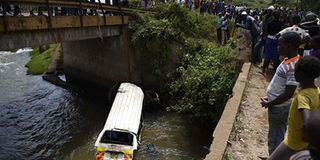Look, we are sinning less and so living longer, thanks to Covid-19

The scene of an accident at River Chepkoilel in Soy, Uasin Gishu County, on November 24, 2017. PHOTO | FILE | NATION MEDIA GROUP
What you need to know:
- People are no longer drink-driving and, because of curfews, are not out there to be beaten by robbers on the street or killed by criminals in the dark as they drive home.
- Some have claimed that whichever way the body count goes, the people who will have been saved by Covid-19 in Africa could easily be over five times the number killed by it.
It is that time of the month when we briefly take our gaze off Covid-19 deaths and infections and look at who is winning or losing from the pandemic and other goings-on shaking our world.
One of the surprise winners in Kenya seems to be the refurbished Kisumu Port. It used to be a big deal in East Africa in the 1960s and ’70s.
Rehabilitated over the past year, it is billed as the next big transport route over Lake Victoria for cargo to Uganda and onward to Rwanda.
Doubters weren’t sure, with the rail link to Kisumu still decrepit and the noises about revival from Uganda seeming like more talk than walk. The port, they said, had dressed in its Sunday best, but had no church to go to.
In December, though, baby steps were taken. The port resumed oil exports to Uganda with the first consignment of wagons with 894,000 litres of diesel on a ship to Port Bell.
Now, with cross-border travel restrictions and 30 to 40-kilometre-long truck queues at the Uganda-Kenya border posts as drivers — who have become major virus spreaders — are tested, Kisumu Port and Lake Victoria are being talked up as the great saviours.
As happens, though, torrential rains have also unleashed flood havoc around East Africa and displaced nearly two million people so far in Kenya, Uganda, Rwanda and Somalia. Rivers have swollen everywhere and are tearing down many areas.
ECOLOGICAL HAZARD
Lake Victoria’s level has also risen to its highest in nearly 60 years. Luxury homes and hotels near the lake have all but disappeared under water, fishing towns are history, and villages near rivers have vanished from the map.
However, these losses and tragedies might be short-lived. The bigger issue is, what happened to the deadly water hyacinth, which has choked Lake Victoria for the past 35 years?
It has probably been carried further away from Lake Victoria into smaller lakes, rivers and streams.
When the high waters recede, and we have emerged from coronavirus refuge, they might just present a new ecological hazard.
The pandemic itself, with all its destruction, has otherwise bequeathed us with unlikely gifts.
Now, in these times, social media, and messaging apps like WhatsApp, have become even nastier snake pits of misinformation and conspiracy theories on the coronavirus.
However, it has always been the way of knowledge that the wheat is buried in the chaff and you have to fish it out, as it is written in Matthew 3:12.
One of the WhatsApp gems explores why there are much fewer hospital admissions and, from anecdotal evidence, deaths in the region.
SIN, PLEASURE
Hospital visits have crashed by as much as 75 per cent in some places. Could it be because transport restrictions mean people can’t get to hospitals?
Could it be because people are afraid of infections and so are not going to healthcare centres?
In places like Uganda, there are indications that the lockdown could have led to a spike in women dying in childbirth. But beyond that, deaths seem like they’re down.
One kite flying on WhatsApp suggests that, in East Africa, the coronavirus has stopped or slowed the two main causes of death in our urban areas — sin and pleasure.
It argues that many illnesses originate from restaurants, clubs and bars. These are the sources of food poisoning from eating unhygienic food. All these people are now either eating little or safer food at home.
“Accidents, robberies, gonorrhoea, HIV/Aids, herpes,” it claims, “mostly start from bars and clubs”.
People are no longer drink-driving and, because of curfews, are not out there to be beaten by robbers on the street or killed by criminals in the dark as they drive home.
ACCIDENTS
Not having lost their inhibition to booze, and without the opportunity, there are few ungodly people about breaking the Seventh (“Thou shalt no commit adultery”) and Tenth Commandments (“Thou shalt not covet.”)
But, perhaps most critically, life chances have dramatically shot where boda-boda (motorcycle taxis) have been banned or restricted to ferrying goods.
In many parts of East Africa, there are wards in hospitals dedicated to victims of boda-boda accidents. These are a huge source of hospitals’ business and the death economy. Covid-19 restrictions and fears have effectively dried up the supply of injured bodies.
With restaurants closed and the children in lockdown, there also is no more junk food; the chicken and chips fried (sometimes) in cocktails including engine oil, the fatty nyama choma, dubious sausage and other cholesterol-filled foods are out.
In comes good old home cooking fresh from the garden, diligently curated by the matriarch.
Some have claimed that whichever way the body count goes, the people who will have been saved by Covid-19 in Africa could easily be over five times the number killed by it. We will wait for it to end and crunch the numbers.
Mr Onyango-Obbo is a journalist, writer and curator of the “Wall of Great Africans”. @cobbo3





